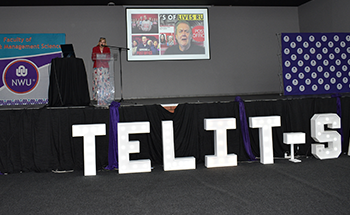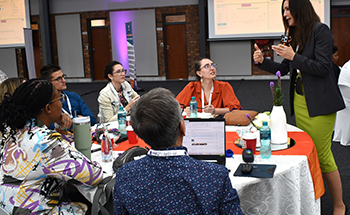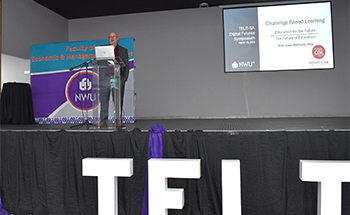The landscape of education is transforming at an unprecedented pace, driven by the rapid advancement of artificial intelligence (AI). This year’s iTLT Digital Futures Symposium, themed “Accelerating education through AI: Collaborative innovation for the future”, brought together leading experts from around the world to explore the ways AI is reshaping teaching and learning.
Held on 17 and 18 March at the Tsebonokeng Hall on the Vanderbijlpark Campus of the North-West University (NWU), the symposium was organised by the research entity Technology Enhanced Learning and Innovative Teaching in South Africa (TELIT-SA), housed within the Faculty of Economic and Management Sciences.
Prof Linda du Plessis, deputy vice-chancellor for teaching and learning at the NWU, officially opened the symposium. She emphasised the significance of AI in education and the need for collaborative innovation to drive meaningful change in teaching and learning practices. Her address set the stage for two days of thought-provoking discussions and knowledge-sharing.
AI tools can enhance learning and bridge gaps
The symposium started off with a compelling keynote by Prof Helen Crompton from Old Dominion University, USA. A globally recognised scholar and the executive director of the Research Institute for Digital Innovation in Learning, Prof Crompton emphasised the transformative potential of AI in education. She described how AI-driven tools can enhance learning experiences, personalise instruction and bridge educational gaps worldwide.
Drawing from her research, which spans collaborations with the United Nations, Oxford University and major tech firms such as Google and Apple, Prof Crompton provided a visionary roadmap for integrating AI into teaching practices.
Mario Paiano and Koen Suilen from Fontys University of Applied Sciences in the Netherlands then presented insights on integrating generative AI into education. Mario, an expert in mixed reality and emerging technologies, showcased how AI can revolutionise classroom experiences. The two presenters demonstrated AI-powered teaching methods that leverage visual storytelling to create engaging learning experiences.
The NWU’s Prof Wian Erlank, a distinguished legal scholar specialising in AI law, cyber law and property law in cyberspace, elaborated on the legal and ethical challenges surrounding AI in education.
Prof Liandi van den Berg, the director of TELIT-SA and organiser of the Digital Futures Symposium, provided valuable insights into the current research being conducted at the NWU on AI integration and usage by NWU students and staff. She showcased the AI student courses that have been developed, as well as preliminary research findings that indicate students are learning to use AI effectively and responsibility. Likewise, she briefly explained the structure and content of the innovative AI lecturer course being developed by TELIT-SA and collaborating colleagues within the NWU.
AI in challenge-based learning
On day two of the symposium, Prof Koen de Pryck of Montclair State University, USA, took the stage to discuss challenge-based learning (where students work together on real-life challenges) and how AI can be incorporated into it. With expertise in e-learning and competency-based education, Prof de Pryck stressed the importance of balancing technological advancements with effective pedagogy, ensuring that challenge-based learning enhances learning experiences.
Passionate IT educator Mark Mettler of Fontys University spoke about the importance of equipping lecturers with the skills to leverage AI’s potential. His hands-on session focused on designing creative AI-driven learning experiences that prioritise innovation and collaboration.
Koen Suilen, a curriculum specialist and co-author of Leven en leren met AI (Living and learning with AI), explored AI’s role in curriculum development. He detailed strategies for responsibly implementing AI tools in education, ensuring they serve as catalysts for critical thinking rather than passive consumption. His research underscores the need for educators to be well-informed on AI to guide students toward responsible and effective usage.
The symposium concluded with Prof Verona Leendertz, deputy dean for research and innovation in the Faculty of Economic and Management Sciences, delivering the closing remarks and vote of thanks.
She expressed her gratitude to the speakers, organisers, and delegates for their contributions and engagement throughout the event. A special word of appreciation went to Zama Chaacha, administrative and liaison officer of TELIT-SA for her massive contribution to organising and hosting the symposium together with various school and research administrative staff members who contributed. Prof Leendertz emphasised the importance of continued collaboration and research in AI and education, encouraging participants to apply the insights gained during the symposium to their teaching and learning environments.
The symposium concluded with Prof Verona Leendertz, deputy dean of research and innovation within the Faculty of Economic and Management Sciences, delivering the closing remarks and vote of thanks. She expressed her gratitude to the speakers, organisers, and delegates for their contributions and engagement throughout the event. A special word of appreciation went to Mrs Zama Chaacha, administrative and liaison officer of TELIT-SA for her massive contribution to organising and hosting the symposium together with various school and research administrative staff members who contributed. Prof Leendertz emphasised the importance of continued collaboration and research in AI and education, encouraging participants to apply the insights gained during the symposium to their teaching and learning environments.

Prof Linda du Plessis, deputy vice-chancellor for teaching and learning, addresses the audience.

Prof Helen Crompton from Old Dominion University, USA, interacts with the audience.

Prof Koen de Pryck of Montclair State University, USA, discusses challenge-based learning and how AI can be incorporated into it.
